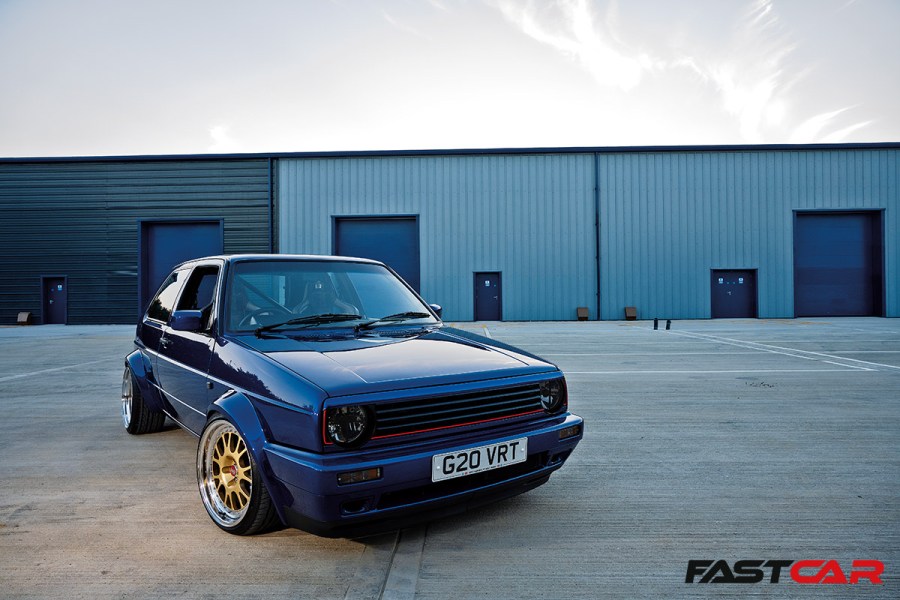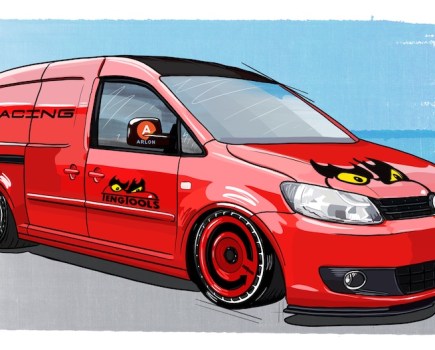Cramming 500hp of turbo’d VR6 and 4Motion into a subtly re-worked Mk2 shell, Tim Dunn’s modified Golf might look like it’s picking the best of the VW parts bin – but it’s heavily inspired by something a little further afield.
The history of performance cars is packed with rivalry, but few are as long-running or closely fought as Volkswagen and Ford’s hot hatch grudge match. GTIs, G60s, VR6s and R models have locked horns with the likes of RS, ST and XR since the early 1980s, and Tim Dunn is unusually familiar with both sides of that divide. Having spent his entire adult life dabbling in the best that each brand can offer, Tim Dunn’s 500hp Mk2 is a meeting of worlds.
“My dream car in school was an Escort Cosworth, so when I had my first GTI I was always drawn to the RS Turbos… with the dump valves going off, and things like that,” he tells us. “At the time, the Mk4 Golf was out of the question because it was brand new and they didn’t have anything turbocharged before that, which is I went down the Ford route. Then I got back into Volkswagens and people were putting 20-valve turbo engines into Mk2s. That seemed like the ultimate Golf, and something I could probably do myself.”
Looking back, Tim had the makings of a life-long Ford fanatic. His uncle kick-started an interest in mechanics while he was in primary school, which developed into a career choice as his older brother enlisted his help working on Fiestas and XR3is as a teenager. By the time Tim started his apprenticeship at 17, he’d already bought – and written off – a Peugeot 309 GTI replica and the barely-roadworthy Mk2 Fiesta van that replaced it wasn’t really living up to the Cosworth ambitions.

From Ford to VW to Ford…
However, the path to this car was steadily unfolding even then. Tim’s apprenticeship paired him with another mechanic, Ernie, who not only taught him how to fix cars and bodywork but also put an influential project his way. A customer had abandoned a Mars Red three-door Mk2 at the garage after the cambelt had snapped, but the damage was minimal. With a new set of valves, the non-running 1.3-litre Golf evolved into a big bumper GTI replica, dropped over a set of 100+ wheels and with a Peco Big Bore exhaust, then eventually made way for an Alpine White 8V GTI.
“The GTI was really punchy, but I swapped it for a Series 2 RS Turbo, which I modded to within an inch of its life – at the time it was up to 237hp. I sold that for a Sierra Sapphire Cosworth and built another RS Turbo, which was featured, before deciding it was time for my Escort Cosworth. I sold the other two and got a loan to buy it, then that had to go when I bought a house,” he recalls.
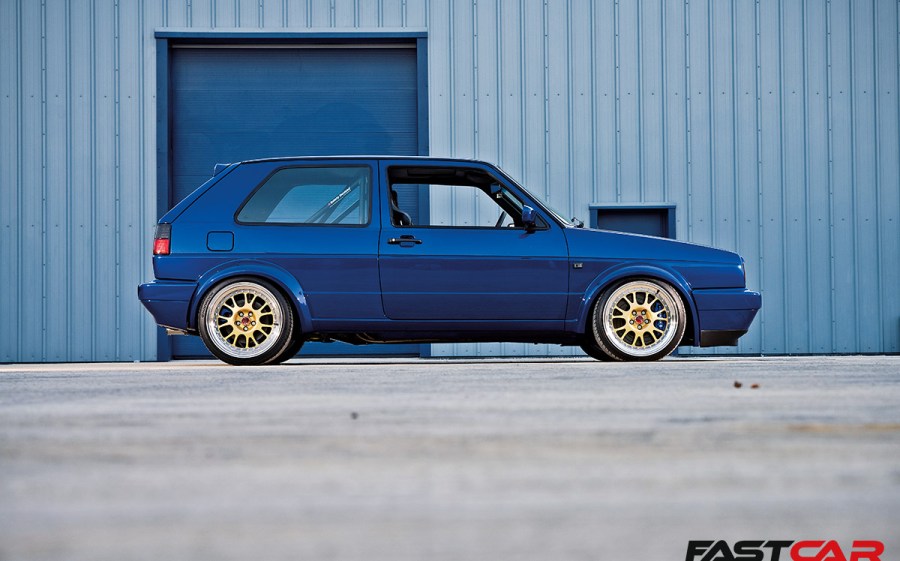
…and back to VW
Ernie’s influence didn’t stop with the Mk2. After a few years working together, the duo left to set up Auto RS, and Tim still runs the same business today. Named to bring in other Cosworth owners and rank highly in alphabetically organised phone books, it’s become a busy workshop with a workload as broad as its owner’s car history, which didn’t take long to recover after life got in the way. Having ticked the Cosworth box and become a homeowner, Tim ended his hot hatch dry spell with a GTI 16V only to quickly lose interest and swap into modern alternatives while his concours Series 1 Escort RS Turbo took shape in the garage. Even this didn’t lure him away from Volkswagen – by the time the finished Ford got its outing as his wedding car, there was another Mk2 waiting to take its place.
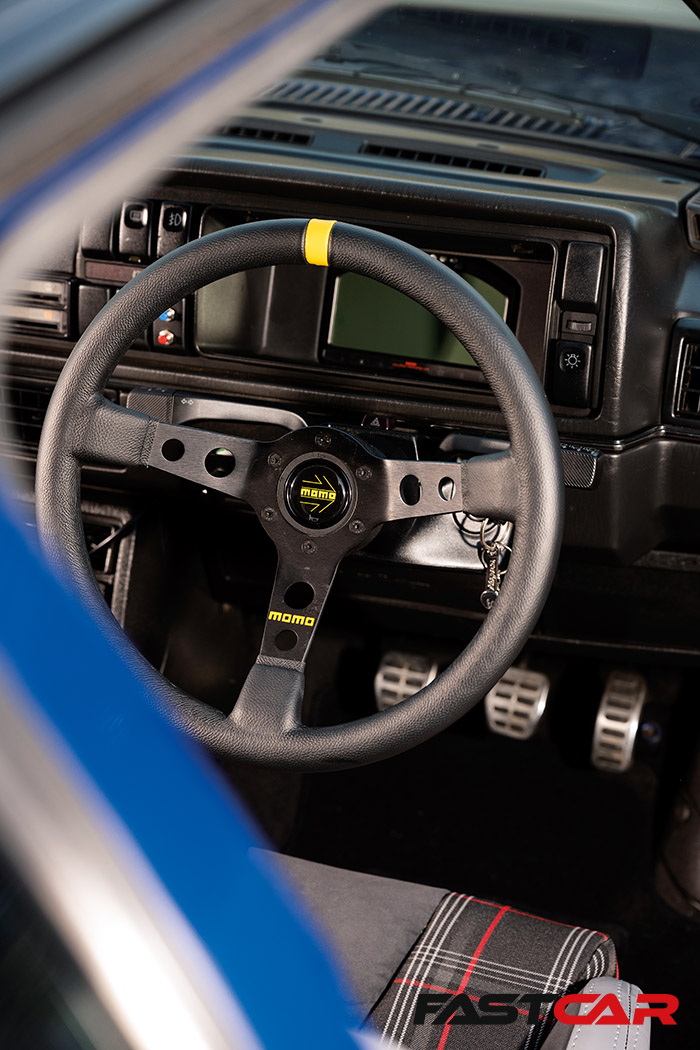
“That Mk2 ended up being the longest I ever owned a car. It was a real sleeper, with a good track spec and K04 hybrid running 370hp, and scary when it was giving everything it had, but I stumbled across some videos online with VR6Ts running 4Motion and doing crazy launches. The VR6 has a distinctive sound, and it’s amazing when it’s turbo’d, so I wanted some of that,” he laughs.
“I had done a sleeper car already, so I had visions of what I wanted – wide arches, deep dish wheels, a roll cage and some modern twists. I decided that, if I could find the parts, then I’d do the build. This was probably going to be my last big project, so I wanted it to be the best I could do.”
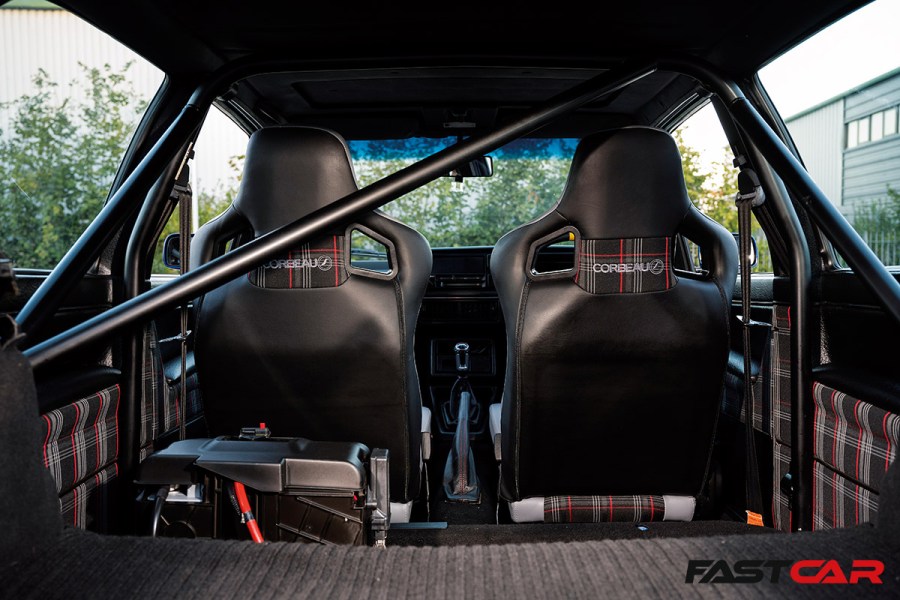
Custom building this modified VW Golf Mk2
Nothing you see here is easy to track down. Tim spent autumn 2019 scouring classified ads for the Syncro conversion, which includes a larger transmission tunnel and raised boot floor for the differential and prop shaft, and a suitable bodyshell. He got lucky on both counts, finding a three-door Driver shell ten minutes from his workshop, then headed to the outskirts of Paris a few days later to pick up the four-wheel drive parts. It’s a perk of living in Kent, and close to the Channel, that this was easier than getting the same gear in the UK.
Well, almost. “It all fitted in the back of a van, but leaning across for the toll booths was a bit of a pain, and the seller couldn’t speak a word of English. We had to type everything into Google Translate and play it back to one another,” he laughs.
“It was worth it though. I’d found the same parts in Newcastle for £2000, but this cost me £1100 plus the ferry fare, so it was about half the price. Everything was there – tunnel, boot floor, rear diff, gearbox, carpets etc, so the work was ready to begin.”

Stripping everything
Being picky with the shell took some of the hassle out of an already intensive rebuild. Weekend by weekend, Tim stripped everything, unpicking the transmission tunnel from the one-piece factory floor pressing then grafting the new panels into place. Almost nothing underneath was originally designed to work together; the front subframe is from a Mk3, while the rear is Mk2-based but modified for a Mk4-platform Haldex differential and paired Mk3 Syncro arms to widen the track. Although the driveshafts are off-the-shelf, the prop had to be custom made with a shortened Audi TT section to fit the O2M gearbox. Every spare part was sold, and the money was pumped back into the Golf’s increasingly lengthy spec sheet.
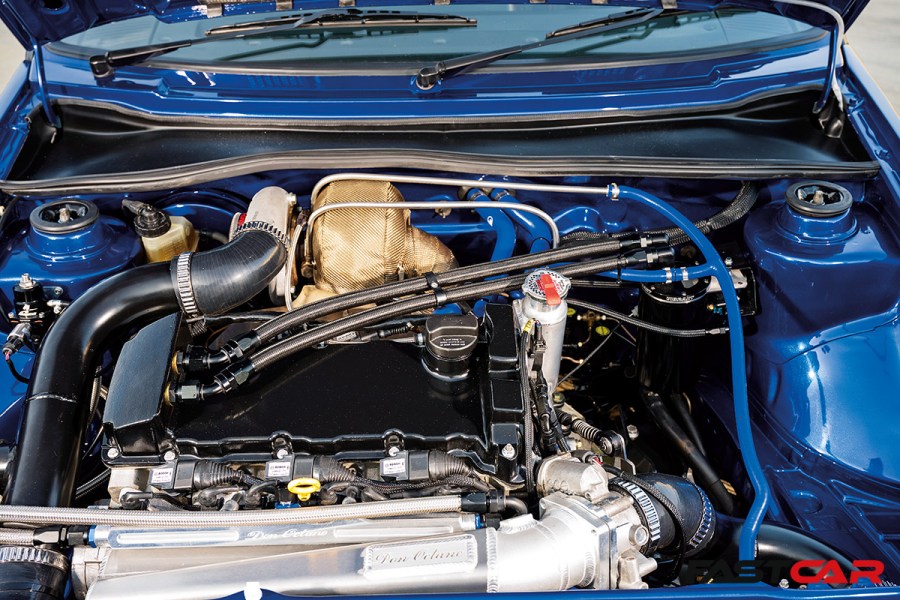
VR6 engine
Naturally, he’d researched the engine spec in detail. The block is balanced and bore lined for the new bearing caps and ARP studs, then fitted with a shallower Mk5 R32 sump and multi-layer head gasket. With plans for a full paint job, everything was trial fitted and trailered to Zero Exhausts for a full custom system and to check for clearance issues. This was a smart move, because even a bespoke exhaust wouldn’t quite fit into the transmission tunnel without further modifications.
“The Americans seem to run a head spacer and don’t do anything to the bottom end, and they’re running 500-600hp no problem at all,” Tim explains, unveiling the tightly packed engine bay. “However, I’d rather go forged and know that it’s okay. The only things they mention are ARP main studs and, if you start to push them to 650-700hp and higher, you want a girdle plate in there. I had a limit of about 500-600hp – the Golf probably won’t cope with much more than that anyway.”
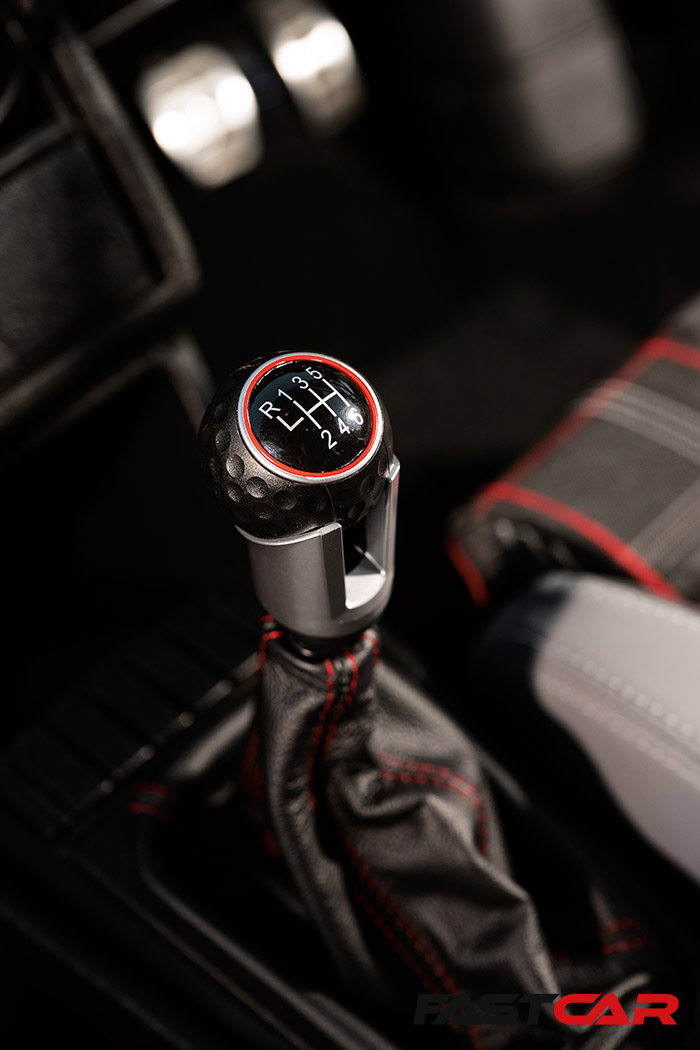
Gearbox modifications
However, not everything was within his control. The modified VW Golf Mk2 uses a strengthened 02M gearbox with a Quaife ATB differential up front, supported by a Haldex controller which enables him to adjust how quickly the rear wheels are engaged. Although he managed to time importing the latter and the MBL arch kit just before Brexit import duties came into force, Covid put paid to any plans for a fast turnaround. The upshot was extra time to figure out solutions to complex problems, like the Race Technology dash, which gets around the O2M’s lack of mechanical speed output. Clever stuff.
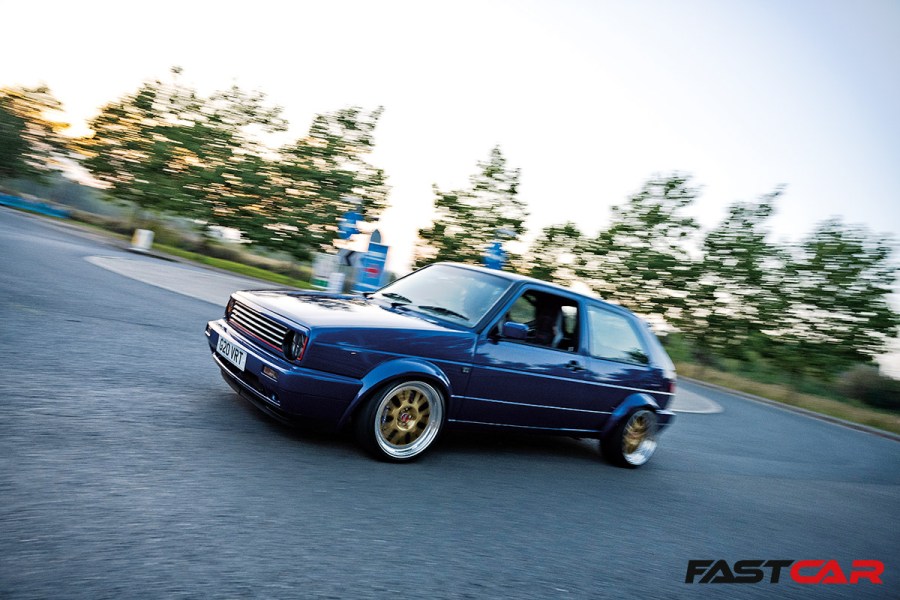
Exterior modifications on the Mk2 VW Golf
Body modifications were taking shape in the background, with that carefully planned stance as a starting point. Instead of taking chances with fitment, Tim tasked Image Wheels with building a set of staggered 17-inch three-piece wheels to fill out an extra four inches of bodywork at each corner and to clear the Tarox big brake kit at the front. Picking the right colour contrast with those gold centres was no easy job. Not that you’d guess, but you’re looking at Plan C.
“Originally the car was going to be either BMW Twilight Purple or Long Beach Blue, but I painted up two wings and they weren’t right for this build. My mate kept saying about San Marino Blue, which I wasn’t sure about, but I painted under the bonnet and it grew on me. I think it suits the hard lines of the Mk2 – in some lights is like Bright Blue Metallic but, being a Xirallic paint. it really alters in light and dark settings.”
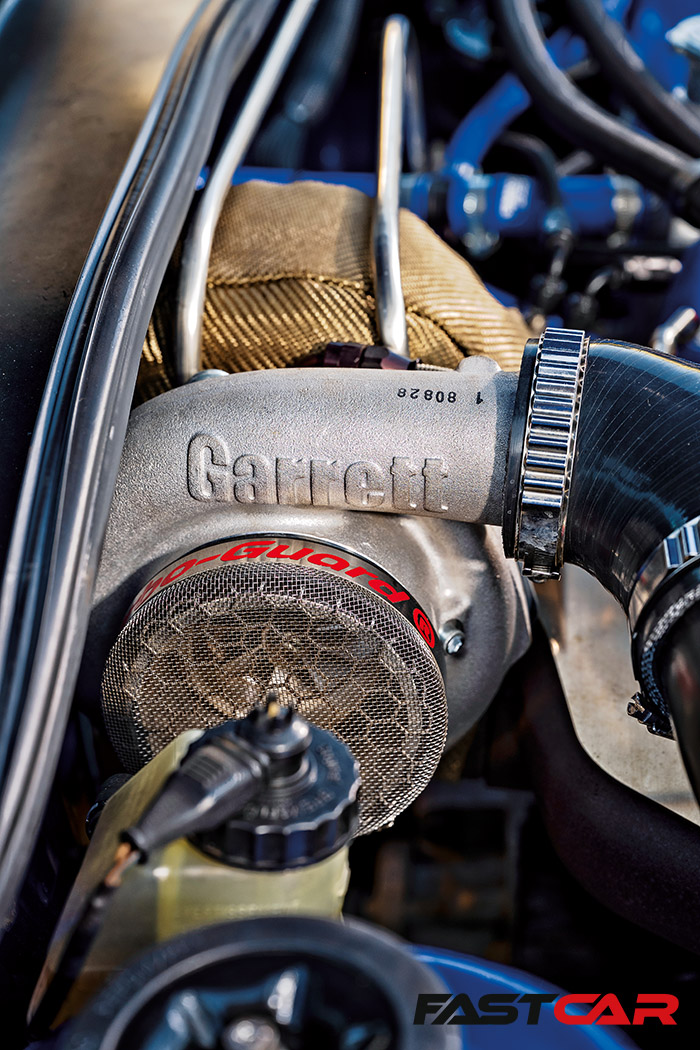
Tuning the modified VW Golf Mk2
It took almost 18 months to know for sure. Lockdowns continued to delay progress, and Tim built a PD130-swapped Mk2 Driver to keep his wandering mind occupied, finishing it just as the main attraction returned from the bodyshop. Reassembly wasn’t entirely straightforward, requiring a scratch-built wiring loom to pair the new hardware with its Ecumaster EMU Black management and get the car ready for mapping.
If a 500hp Mk2 had been unusual back when he had his first GTI, then the finishing touches getting it back on the road would have been unimaginable. The management uses an R32 base map, carefully honed to the Mk2’s spec by a specialist called Deondré. Deondré hasn’t seen the car in the metal – he’s based in Grenada, and everything was done remotely.
“I normally turn a car around in 18 months, maybe two years, but Covid delayed it, the bodyshop had it for a long time and we had our third baby in between as well. Everything slowed this one down, but that gave me time to concentrate on the bits that I would normally have skipped over. Thinking about it and saving up more money, I’ve ultimately specced it better.”
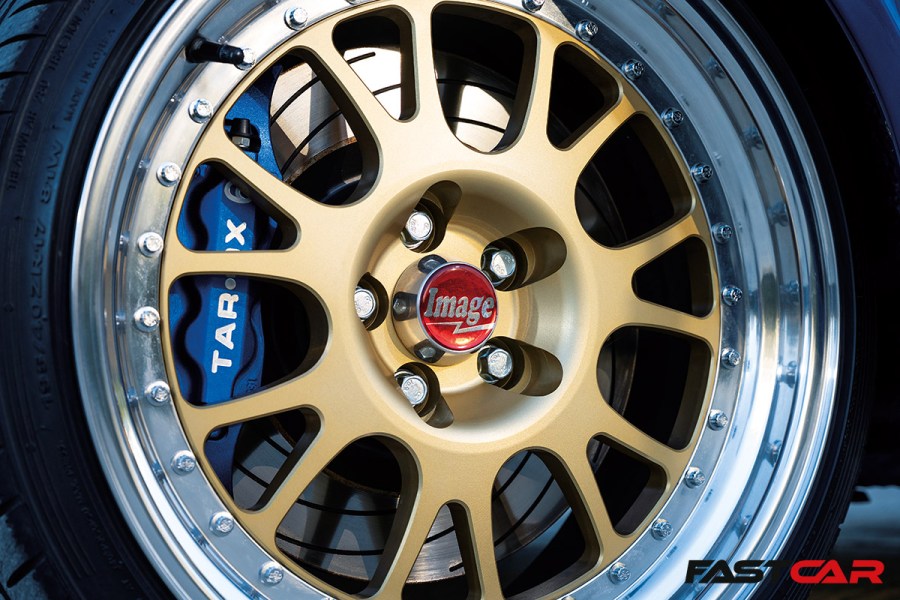
Minute details
You get a sense of that in the details. Despite the aggressive presence and decidedly un-subtle performance, Tim worked hard to retain the Mk2 styling that lured him in at the start. Every component added to or deleted from the bodywork serves to enhance the original lines, and even the interior borrows heavily from the GTI heritage. Volkswagen stopped short of stripping and caging a factory road-going Mk2, but the Corbeau buckets and door cards in matching red pinstripe tartan are unmistakeable.


Better yet, it’s worked almost perfectly out of the box. Upgrading from a Corrado VR6 radiator – the only one that would fit in the available space between the inlet manifold and intercooler – to a taller, wider Pro Alloy one has cured warm-weather overheating. Although Tim admits taller diesel final drives would improve driveability, the end result is a perfect blend of classic hot hatch styling, subtly modernised and injected with supercar performance to match.
“We are now up to 22 PSI of boost and timing is still slightly conservative, but I think it must be getting close to 500bhp now,” he smiles. “The VR6 gets rid of some of the turbo lag you’d get on a four-cylinder, so it’s really responsive and boosts very quickly – you wouldn’t know it was a larger turbo the way it comes in. The Escort Cosworth is still one of my favourite cars, but they’re £60,000 to £70,000 now and mine was 360hp – the Golf would wipe the floor with it.”
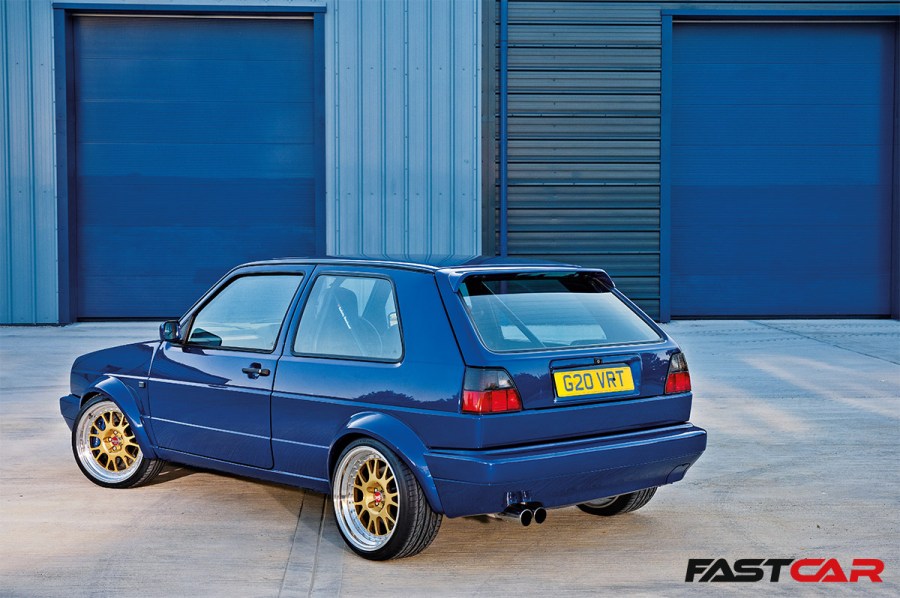
Conclusion
Hardly surprising, then, that this modified VW Golf Mk2 is sticking around even longer than its predecessor. Decades of rivalry – at the factory and enthusiast level – have raised the stakes on both sides of the Volkswagen-Ford hot hatch grudge match. But if the middle ground between them shapes up like this, then we’re all for being open-minded.
Words: Alex Grant. Photos: Jason Dodd.
Want to see cars like this in person? Be sure to check out our premier car events!

